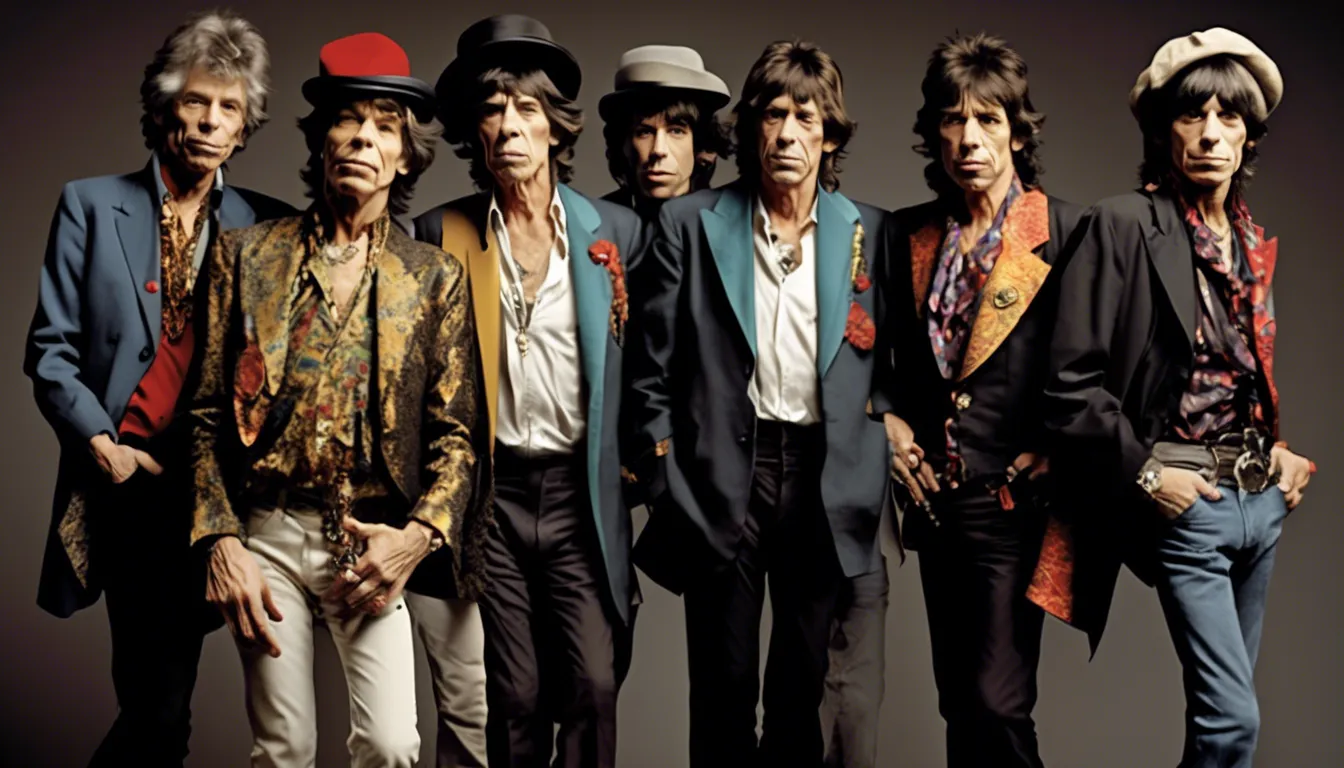The Rolling Stones: A Timeless Legacy In Rock 'n' Roll
**You’ve probably heard their name thrown around in conversations about legendary rock bands, but let me tell you, The Rolling Stones aren’t just another band—they’re a cultural phenomenon. If rock 'n' roll had a heartbeat, The Rolling Stones would be the rhythm keeping it alive. From their gritty sound to their rebellious spirit, this iconic group has left an indelible mark on music history. But what exactly makes them so special? Stick around, because we’re about to dive deep into their legacy.**
Now, if you’re anything like me, you’ve probably wondered why The Rolling Stones are often referred to as "The World’s Greatest Rock 'n' Roll Band." It’s not just a catchy slogan; it’s a statement rooted in decades of unmatched talent, charisma, and pure rock energy. Their music isn’t just something you listen to—it’s something you feel deep in your soul. So, whether you’re a die-hard fan or just someone curious about their impact, you’re in for a wild ride.
What makes The Rolling Stones so timeless? Well, buckle up, because we’re going to explore everything from their early days to their current status as rock legends. This isn’t just a story of a band—it’s a journey through the evolution of rock 'n' roll itself. And trust me, by the time you finish reading, you’ll understand why they’ve earned their place in music history.
Read also:Chloe Radcliffe Rising Star Of The Digital Age
Table of Contents
- Biography: The Rolling Stones
- The Early Days of The Rolling Stones
- Key Members and Their Roles
- Iconic Songs That Defined Rock 'n' Roll
- Live Shows: The Heart of Their Legacy
- Cultural Impact Beyond Music
- Challenges Faced by The Rolling Stones
- The Rolling Stones in the Modern Era
- Awards and Recognition
- What’s Next for The Rolling Stones?
Biography: The Rolling Stones
Let’s start with the basics. The Rolling Stones were formed way back in 1962 in London, England. They didn’t just pop up out of nowhere; their roots run deep in the blues and rhythm & blues scene of the early '60s. The band was founded by Mick Jagger, Keith Richards, and Brian Jones, who were all heavily influenced by American blues artists like Muddy Waters and Howlin’ Wolf. If you think about it, they took those bluesy roots and turned them into something that would change the world forever.
But who exactly are these guys? Here’s a quick breakdown:
Band Members and Their Contributions
| Name | Role | Key Contributions |
|---|---|---|
| Mick Jagger | Lead Vocals, Harmonica | Known for his electrifying stage presence and vocal prowess. |
| Keith Richards | Rhythm Guitar, Backup Vocals | Co-wrote many of the band’s biggest hits and defined their signature sound. |
| Charlie Watts | Drums | Provided the steady heartbeat of the band until his passing in 2021. |
| Ron Wood | Lead Guitar, Backup Vocals | Joined in 1975 and added his unique flair to the band’s sound. |
| Bill Wyman | Bass Guitar | Part of the original lineup, known for his inventive basslines. |
Each member brought something special to the table, and together, they created a sound that was raw, powerful, and undeniably rock 'n' roll.
The Early Days of The Rolling Stones
Back in the early '60s, the music scene was ripe for change. The Rolling Stones stepped onto the stage at a time when rock 'n' roll was still finding its voice. Their early days were marked by a deep love for blues music, which they infused into their own style. Think about it—they weren’t just copying American blues; they were reinventing it for a new generation. Songs like “Come On” and “Not Fade Away” showcased their ability to blend traditional blues with a modern edge.
Breaking Through the Noise
It wasn’t all smooth sailing, though. In the beginning, The Rolling Stones faced criticism from the media and even some fans who preferred the more polished sound of The Beatles. But they didn’t let that stop them. Instead, they leaned into their rebellious image and let their music speak for itself. By the mid-'60s, they were breaking records and becoming household names. And let’s not forget about their infamous clashes with authority figures, which only added to their mystique.
Key Members and Their Roles
Every great band has its key players, and The Rolling Stones are no exception. Mick Jagger, with his swagger and charisma, became the face of the band. Keith Richards, on the other hand, was the mastermind behind the music, crafting riffs that are still studied by guitarists today. Charlie Watts kept the beat steady, while Ron Wood added his own touch to the band’s sound after joining in the '70s.
Read also:Emily Lind Rising Star In The Entertainment World
But what about Brian Jones? Often overshadowed by his bandmates, Jones was a founding member whose contributions were invaluable. He brought a diverse range of instruments to the band, from the sitar to the marimba, and helped shape their early sound. Tragically, his life was cut short in 1969, but his legacy lives on in the music he helped create.
Iconic Songs That Defined Rock 'n' Roll
When you think of The Rolling Stones, certain songs immediately come to mind. “(I Can’t Get No) Satisfaction,” “Paint It Black,” “Angie,” and “Start Me Up” are just a few of the classics that have become staples of rock 'n' roll. But what makes these songs so iconic? It’s not just the catchy melodies or the unforgettable lyrics—it’s the way they capture the essence of rock 'n' roll itself.
A Taste of Their Discography
- “(I Can’t Get No) Satisfaction” - A song that defined a generation with its unforgettable guitar riff.
- “Paint It Black” - A hauntingly beautiful track that showcases the band’s versatility.
- “Angie” - A tender ballad that proved The Rolling Stones could do more than just rock.
- “Start Me Up” - A track that became an anthem for fans around the world.
These songs aren’t just music—they’re cultural touchstones that continue to resonate with listeners today.
Live Shows: The Heart of Their Legacy
One of the things that sets The Rolling Stones apart is their live performances. They’re not just about playing the songs—they’re about creating an experience. From the moment Mick Jagger steps onto the stage, the energy is electric. The band has been touring for over six decades, and they still bring the same level of intensity to every show.
Why Their Live Shows Are Unforgettable
It’s not just the music that makes their live shows so special—it’s the entire production. Think massive stages, pyrotechnics, and a level of showmanship that’s hard to match. And let’s not forget about the fans. There’s something magical about watching thousands of people come together to celebrate the music they love. Whether you’re a lifelong fan or a first-time attendee, a Rolling Stones concert is an experience you’ll never forget.
Cultural Impact Beyond Music
The Rolling Stones aren’t just musicians—they’re cultural icons. Their influence extends far beyond the music world, touching everything from fashion to politics. In the '60s and '70s, they were at the forefront of the counterculture movement, challenging societal norms and pushing boundaries. Their rebellious spirit inspired countless artists, activists, and even everyday people to think differently about the world around them.
Changing the Game
They didn’t just stop at music. The Rolling Stones were also pioneers in the business side of the industry. They were one of the first bands to take control of their own image and branding, paving the way for future artists to do the same. And let’s not forget about their impact on fashion. From Mick Jagger’s signature moves to Keith Richards’ signature style, they’ve influenced trends for decades.
Challenges Faced by The Rolling Stones
Of course, no journey is without its challenges. Over the years, The Rolling Stones have faced their fair share of obstacles. From personal struggles to band dynamics, they’ve had to navigate a lot to stay together. But through it all, they’ve managed to keep their music at the forefront.
Overcoming Adversity
One of the biggest challenges they faced was the loss of Brian Jones in 1969. His death was a blow to the band, but they managed to continue and even thrive. They’ve also dealt with personal issues, such as drug addiction and legal troubles, but they’ve always found a way to come back stronger. It’s a testament to their resilience and dedication to their craft.
The Rolling Stones in the Modern Era
Even in today’s fast-paced world, The Rolling Stones remain relevant. They’ve embraced new technologies and platforms, using them to connect with fans across the globe. Social media has allowed them to share their music and experiences with a new generation of fans, while their continued touring proves that they’re not slowing down anytime soon.
Adapting to Change
They’ve also shown a willingness to evolve musically, experimenting with new sounds and styles while staying true to their roots. Their latest album, “Blue & Lonesome,” was a return to their blues roots, reminding fans of where it all began. It’s this ability to adapt and reinvent that keeps them at the top of their game.
Awards and Recognition
It’s no surprise that The Rolling Stones have been recognized for their contributions to music. They’ve won numerous awards, including multiple Grammy Awards and induction into the Rock and Roll Hall of Fame. But beyond the accolades, their true legacy lies in the impact they’ve had on countless artists and fans around the world.
Recognition Beyond Awards
They’ve inspired generations of musicians, from Aerosmith to The Black Keys, and their influence can be heard in countless songs across genres. Their ability to transcend generations is a testament to their enduring appeal and the timeless nature of their music.
What’s Next for The Rolling Stones?
As we look to the future, one thing is certain: The Rolling Stones aren’t done yet. With new music in the works and tours planned, they show no signs of slowing down. Their fans can expect more of the same—iconic songs, unforgettable performances, and a continued commitment to pushing the boundaries of rock 'n' roll.
So, what’s next for these legends? Only time will tell, but one thing is for sure: The Rolling Stones will always have a place in the hearts of music lovers everywhere.
Kesimpulan
To wrap things up, The Rolling Stones aren’t just a band—they’re a symbol of everything that’s great about rock 'n' roll. From their early days in London to their current status as global icons, they’ve left an indelible mark on the music world. Their music, their live shows, and their cultural impact have all contributed to their timeless legacy.
So, if you haven’t already, go listen to some of their classics. Trust me, you won’t regret it. And if you’re feeling inspired, why not leave a comment or share this article with a friend? The more people who discover the magic of The Rolling Stones, the better. After all, rock 'n' roll is all about sharing the experience. Keep it rolling, folks!


